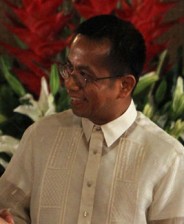Enrile grills Neda chief on population, economics
Director General Arsenio Balisacan of the National Economic Development Authority didn’t know what hit him.
He could only hem and haw when questioned by Senate President Juan Ponce Enrile on the relationship between population and economic growth.
On the hot seat briefing the Senate on the Aquino administration’s proposed annual budget of P2.006 trillion for 2013, Balisacan was making a case for how neighboring economies took off because their “dependent” population of young citizens shrank while their labor forces grew when Enrile intervened.
“Are you suggesting (we) adopt … population control in the country?” asked Enrile, who attended a rally sponsored by the Catholic Church on Saturday in a show of clout—somehow dampened by monsoon rain—against a perceived administration move to ram through the controversial reproductive health (RH) bill in the House of Representatives.
“Ah, I don’t think, sir, that we need to really provide the same level of access to the poor in terms of…” Balisacan trailed off.
“All right, I’ll reverse the question,” Enrile interposed. “What in your opinion as an economist and in charge of national economic development, what should be the ideal level of population growth for the country?”
“I, I, I, sir, I think that we can move naturally in the same way…” Balisacan stammered.
“You’re the economist, you must have an idea,” Enrile said.
Balisacan noted that the United Nations had set a 2.1-percent fertility rate for countries.
Enrile asked how the Philippines fared.
Balisacan said the country had a population growth rate of “roughly 2 percent, actually 1.98 percent.”
“In other words we are below the UN acceptable rate,” Enrile remarked.
Sen. Ralph Recto interposed, saying, “more or less we are in a sustainable growth rate.”
Enrile’s recipe for growth
Enrile then turned to other economic managers present at the hearing—Budget Secretary Florencio Abad, Finance Secretary Cesar Purisima and Bangko Sentral Governor Amando Tetangco Jr.
He asked them to provide the Senate figures on growth rates of government investments, private internal investments and foreign investments in the Philippines.
“For me, these are the most important ingredients of growth in any country. It’s not population. I’m sorry but that’s my position,” Enrile said. “China, Vietnam, Japan, all the prosperous countries did not grow by themselves. They grew because of massive investments.”
Economists say China upon the death of Mao Zedong eschewed socialist policies and embraced capitalist ways, particularly in agriculture and manufacturing, thereby transforming the world’s most populous nation into the second biggest global economic powerhouse.
Another factor in China’s development was massive foreign investments as part of an inclusive economic thrust, meaning everyone is a beneficiary of development, as opposed to an extractive economy run by the elite, meaning profit largely goes to the ruling class.
The World Bank says foreign direct investments in the Philippines amounted to $1.6 billion in 2011, compared to Indonesia’s $18.26 billion. Vietnam says it received $14.7 billion in foreign direct investments last year.
The questions of Enrile, who is pushing for amendments in the Constitution’s economic provisions to encourage foreign investments in the country, were a reaction to a warning by the country representative of the UN Population Fund that the nation’s economic development was being threatened by inaction on the RH bill.
Head-scratching Drilon
Sen. Franklin Drilon, chair of the Senate finance committee, later told reporters of Balisacan’s performance, “Like a typical economist, the answer was so guarded and with so many assumptions that honestly, I could not figure out where exactly he stands in relation to population and the economy.”
Balisacan sounded more articulate during an ambush interview by reporters after Enrile left. Speaking in a firmer voice, the Neda boss said “rapid” population growth constrained the country’s ability to move to a higher long-term growth path.
He said the Aquino administration’s game plan was to “break away from the high dependence or high contribution of young age population to total population.”
“We would want to see growth in population coming from the labor force. In other words, there should be a demographic transition,” Balisacan said.
He said this was being undertaken by the Philippines’ more progressive neighbors like South Korea, Taiwan and Vietnam.
Adopting the same strategy would allow the poor in the country to use their limited resources for “better education, health and nutrition for their children.”
He said this would make the poor “highly productive adults when they join the labor force.”
Asked whether his statements meant support for the RH bill, Balisacan replied, “The intent of the bill is really to provide opportunities for poor people to manage their own family size, to provide their children better opportunities through health and education investments.”
